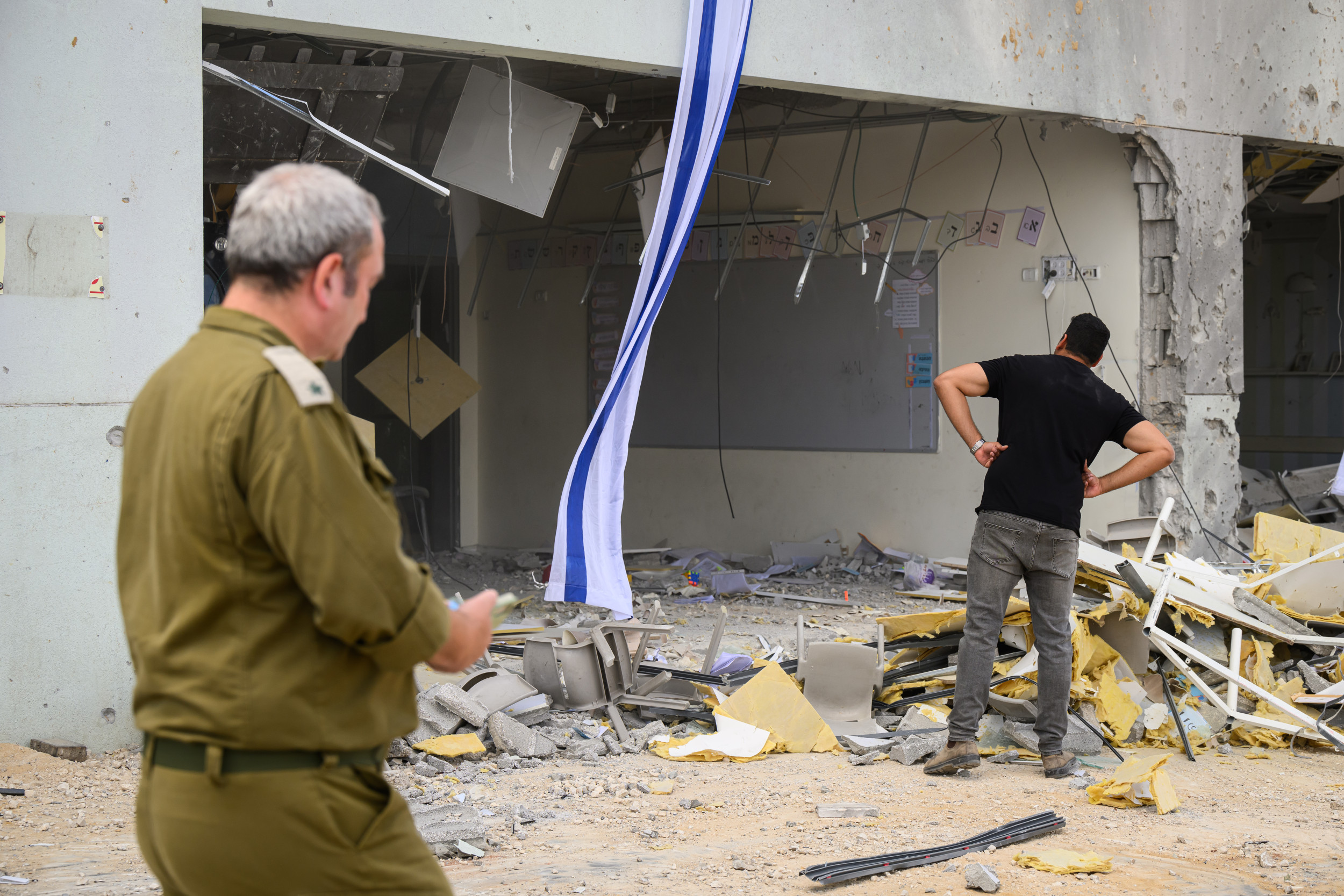Israel Braces for another round of Iranian missiles

A Jerusalem resident has told Newsweek how she is braced for more missile attacks on Israel following the Jewish new year, Rosh Hashana, and described living in fear of being hit by an explosion.
When 200 Iranian ballistic missiles came raining down on Israel last Tuesday, Polina Hasin rushed with her mother, her son and her dog to their apartment building’s bomb shelter.
From there, they could hear the explosions overhead as Jerusalem’s Iron Dome defense system shot down missiles over the city’s skies.
“It was very frightful, because you hear the huge booms. And there is another danger that the fragments of the rockets can fall down on people,” she told Newsweek.
Leon Neal/Getty Images
One of her friends was driving from northern Tel Aviv to Netanya, a city in north central Israel, when the Iranian missiles came flying over.
“He is a guy who served in the army, and who has a vast security experience, and he said that I haven’t ever seen anything so frightful. It was just a rain of fireworks, huge fireworks everywhere, everywhere.”
Israeli authorities advise people to get out of their car during a missile attack and lie down several meters from their vehicle.
“I asked my friend: ‘What did you do?’ And he said, you know, I was so frightened that I was just driving like crazy. And praying.”
“This time was the worst possible imaginable attack one can think of and the [Israeli] territory is very small,” Hasin said.
Israeli military spokesman Rear Admiral Daniel Hagari told the Associated Press that the country’s air defenses intercepted many of the Iranian missiles, though some landed in central and southern Israel.
This was Iran’s second direct attack this year—they fired 300 missiles and drones last April, on top of the thousands of missiles it has given to Hezbollah to fire from Lebanon into northern Israel.
Among Hasin and her neighbors in west Jerusalem, there is much speculation about what will happen next.
She believes that the Israeli military were waiting for the end of the Jewish new year, Rosh Hashana, on October 4 and are now preparing to strike Iran with jet fighters.
That, she says, will prompt a response from Iran and more anxious waiting in Jerusalem.

Polina Hasin
Hasin, an attorney and geopolitical analyst, also believes that her neighborhood of Givat Mordechai is particularly vulnerable.
“Iran does not want to bomb Arab east Jerusalem. Here in West Jerusalem, it is mostly Jewish and there is unlikely to be collateral damage,” she said.
Iran has been largely fighting a proxy war with Israel, pouring hundreds of millions of dollars into Hamas in Gaza; Hezbollah in Lebanon and Houthi rebels in Yemen.
Tensions have escalated since the October 7 Hamas attack on Israeli, in which 1,195 Israelis were killed and Israeli’s counterattack in Gaza, in which 41,788 Palestinians have been killed as of Thursday, according to the Hamas-run Gaza health ministry.
With Israel now fighting a war on four fronts, Gaza, Lebanon, Iran and Yemen, the conflict has become very real for the people of Jerusalem, who have largely been spared the chaos of Hezbollah rockets being fired into northern Israel.
The multi-fronted war is coming home to Jerusalem in many ways.
“All the time now, we’re hearing the [Israeli] fighter jets going to Lebanon. That didn’t happen during the first part of the war with Hamas because the planes were flying in different directions. Now they’re flying right over Jerusalem to the north,” Hasin said.
Hasin, who is part Ukrainian, has studied the missile systems being used by Russia in Ukraine and sees striking similarities with the missiles Iran is firing at Israel.
“During the last two years security cooperation between Russia and Iran has grown significantly. The Russians are sending engineers and sharing their technologies and Iranians have improved their production of drones and ballistic missiles. Russians have even sent them antimissile systems S-400 and S-300 so they are much more protected,” she said.
The Russian S series, which are surface to air missiles, can be adapted for use as antimissile systems.
Sky News reported on Wednesday that the Russian government “has been supplying Iran with increasingly sophisticated air defense systems, reportedly including the S-400, which is a step up from the Russian S-300 that Iran already operates.”
Newsweek sought email comment from the Russian and Iranian embassies in London on Friday.
For Hasin, the instability in the Middle East is helping Russia’s economy by pushing up the price of oil. That is badly needed as Russia struggles to keep its war going in Ukraine.
“They know that one of the possible Israeli reactions can be the bombing of the Iranian oil facilities. So the oil prices have already risen. So this ultimate goal is being realized,” she said.
Related
Qatar emphasizes importance of reaching agreement between US, Iran
CAIROQatar's Prime Minister Sheikh Mohammed bin Abdulrahman Al-Thani stressed the critical need for an agreement between the US and
International Women’s Day: Seeking a Balance with Ghada Al Subaey
1309’s Ghada Al Subaey of Qatar celebrates the many layers of femininity in her recent drop, called Labyrinth of Light. This International Women’s Day, the
Discover Ooredoo Plans and Services in Qatar
Ooredoo is the household name in the field of telecommunications and provides a full portfolio of telecom services: mobile plans for everyone, home
What Will The Imminent Qatar Airways Widebody Order Include?
Which Airline Alliance Do You Prefer To Fly With?












